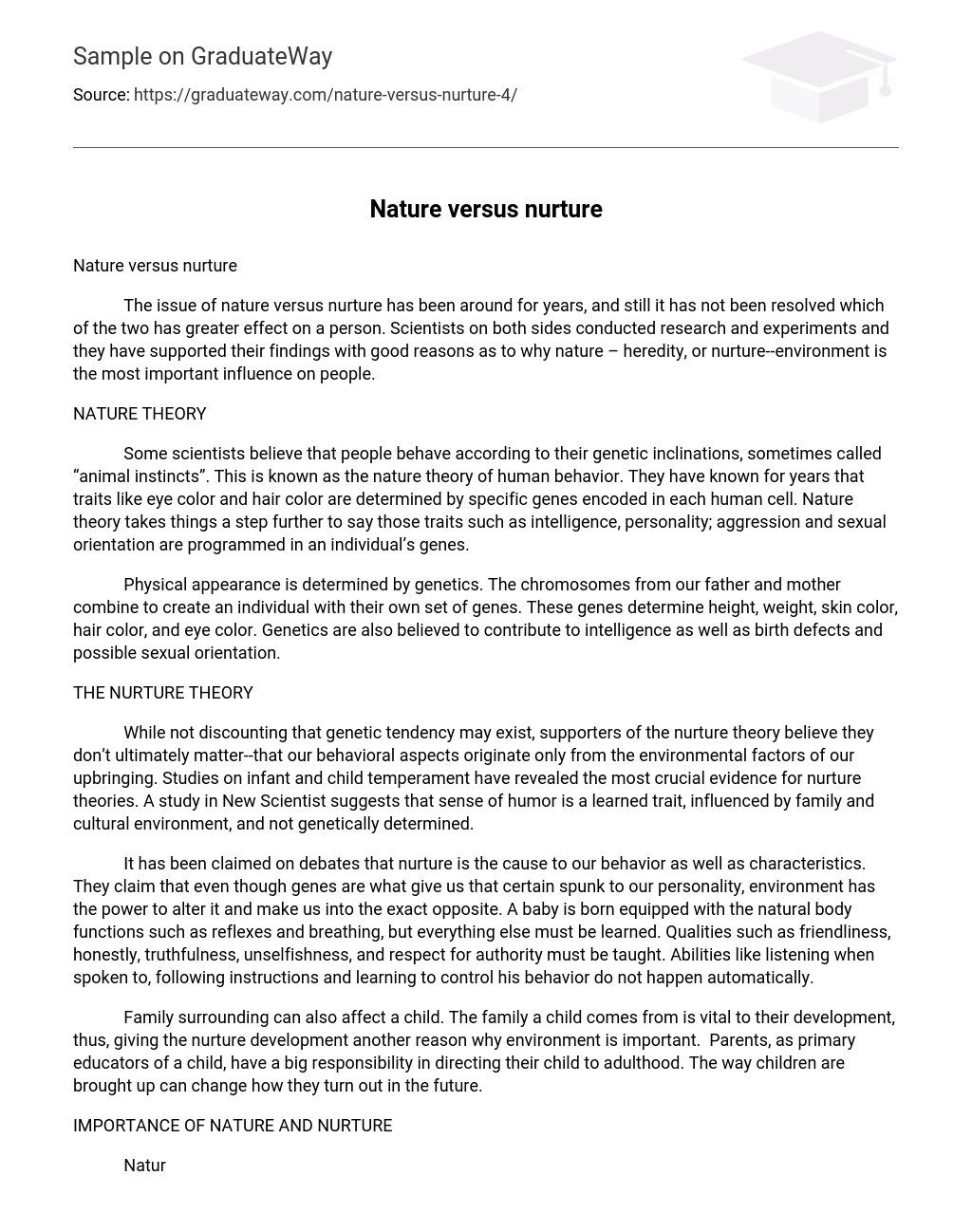The issue of nature versus nurture has been around for years, and still it has not been resolved which of the two has greater effect on a person. Scientists on both sides conducted research and experiments and they have supported their findings with good reasons as to why nature – heredity, or nurture–environment is the most important influence on people.
NATURE THEORY
Some scientists believe that people behave according to their genetic inclinations, sometimes called “animal instincts”. This is known as the nature theory of human behavior. They have known for years that traits like eye color and hair color are determined by specific genes encoded in each human cell. Nature theory takes things a step further to say those traits such as intelligence, personality; aggression and sexual orientation are programmed in an individual’s genes.
Physical appearance is determined by genetics. The chromosomes from our father and mother combine to create an individual with their own set of genes. These genes determine height, weight, skin color, hair color, and eye color. Genetics are also believed to contribute to intelligence as well as birth defects and possible sexual orientation.
THE NURTURE THEORY
While not discounting that genetic tendency may exist, supporters of the nurture theory believe they don’t ultimately matter–that our behavioral aspects originate only from the environmental factors of our upbringing. Studies on infant and child temperament have revealed the most crucial evidence for nurture theories. A study in New Scientist suggests that sense of humor is a learned trait, influenced by family and cultural environment, and not genetically determined.
It has been claimed on debates that nurture is the cause to our behavior as well as characteristics. They claim that even though genes are what give us that certain spunk to our personality, environment has the power to alter it and make us into the exact opposite. A baby is born equipped with the natural body functions such as reflexes and breathing, but everything else must be learned. Qualities such as friendliness, honestly, truthfulness, unselfishness, and respect for authority must be taught. Abilities like listening when spoken to, following instructions and learning to control his behavior do not happen automatically.
Family surrounding can also affect a child. The family a child comes from is vital to their development, thus, giving the nurture development another reason why environment is important. Parents, as primary educators of a child, have a big responsibility in directing their child to adulthood. The way children are brought up can change how they turn out in the future.
IMPORTANCE OF NATURE AND NURTURE
Nature and nurture are joined in together in ways that many do not see. Our genes are important because what we have inherited is essentially the basis of what kind of person we are today, the environment can change a person even more. As nature is a type of genetic inheritance, nurture is what we live through during our lifetime.
If other children are genetically inclined to violence, but live and grow up in a good home, they may overcome their flaws. While those that live in an abusive family may likely engage in criminal activities in the future.
One example that show nature and nurture are mixed in with each other is a study made on twins. Identical twins were brought up apart to determine whether nature or environment has more influence on what kind of persons they will be.
It turned out that both shared common interests in food, sports, both struggled in math, and both showed similarities in temperament, way in doing things, and pace. They showed differences in their working habits, and thoughts—one was liberal, while the other turned out to be traditional. Their similarities were mainly due to their genes, but their differences stemmed from the environment where they grew up. This study showed that nature and nurture have influence over one another and both have a big impact on the development of a person.
REFERENCES
- Guirguis, Shady. (26April 2004). NE 24. Nature vs nurture. http://www.nuc.berkeley.edu/courses/…/Equalitarinism_vs_Hereditarinism.htm. Accessed 25February 2008.
- Plessis du, Susan. (n.d.). Child development: nurtured by love or matured by nature? http://www.audiblox2000.com/early_childhood/child_development.htm. Accessed 25February 2008.





